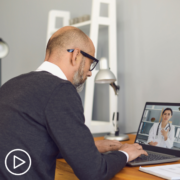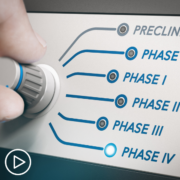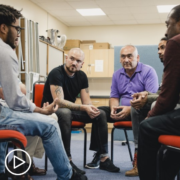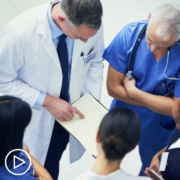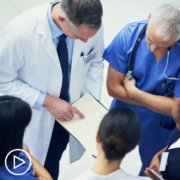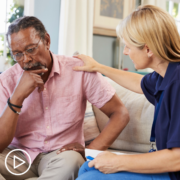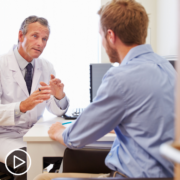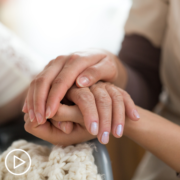How Will Telemedicine Impact Prostate Cancer Clinical Trials?
How Will Telemedicine Impact Prostate Cancer Clinical Trials? from Patient Empowerment Network on Vimeo.
How will prostate cancer clinical trials be changed by the addition of telemedicine to the treatment toolbox? Expert Dr. Leanne Burnham details patients who can benefit from telemedicine visits — and explains some of the history of discrimination in medical care for BIPOC patients and treatment response of African American men with prostate cancer
See More From the Prostate Cancer TelemEDucation Empowerment Resource Center
Related Resources:
Transcript:
Dr. Leanne Burnham
So clinical trials, the whole concept of clinical trials has really come to the forefront of the media right now with everything that’s happened in 2020 and currently with COVID.
And so a lot of people, if they were not aware of discrimination in medical care or clinical trials in the history of the U.S., then now they’re starting to become well-versed in it. So now people are hearing, “Oh, Tuskegee syphilis experiment,” where those of us who are in science, in medicine study health series research is, this is not new to us, so we’re grateful that it’s coming to the forefront. People are learning about it, but there is a justifiable medical mistrust by many Black and Brown people, but African Americans in particular, because of what has been done and not done in terms of medical treatment in the past 400 years. And so, because of this medical mistrust, that leads to sometimes a hesitancy to participate in clinical trials, because there’s an idea of, I don’t want to be a guinea pig, so that’s just one aspect that leads to less enrollment in clinical trials. There’s the whole other side of things, right? There’s the fact that a lot of African American patients are not asked to be in a clinical trial, they’re not explained what the clinical trial entails, a lot of people don’t realize that clinical trial patients have access to what I call what I consider to be VIP access to what is cutting-edge, and it doesn’t mean that it’s not new, that it hasn’t been tested extensively. It’s just now that it’s available to a patient at a particular disease stage that we might be looking at, and we have a lot of reason to believe that it will help that patient.
So a patient that’s enrolling in a clinical trial has access to the VIP treatment. And then as an added bonus, they actually have extra engagement with providers, extra touchpoints with their providers that patients that are receiving standard of care and not enrolled in a clinical trial don’t have as much access to. That being said, in addition to that, for us to really forward medicine in what we call precision medicine, which is able to have medication that’s tailored to an individual person based on their DNA makeup, based on how their body would individually respond to a drug. It’s super important, highly important that we have diversity in patients that are enrolled in clinical trials. For example, if you don’t have enough African American men enrolled in the clinical trial for prostate cancer, then you don’t really know if that medication would work worse or even better in that patient. And what we’re actually seeing is there has been a development of race-stratified clinical trials in the past less than 10 years, really around five years, where we’ve looked at chemotherapy, we looked at hormone therapy, and we looked at immunotherapy, where we include enough African American men in the trials, and we look at how the drug responds in African American men versus other men. And we see that African American men actually have a better treatment response than other races, so how amazing is that? Where you have a demographic that is more likely to get aggressive prostate cancer and die much younger, and we’re seeing that if they’re given the new treatments that are really tailored to target the disease in ways that we weren’t able to do it before, that they’re responding better and having longer survival and better outcomes. And so it’s really important for all those reasons I described to increase African American participation in clinical trials.
Now, I say all that to get to this point, which is, enrollment is not easy when you don’t live near a clinical trial center or a hospital that’s offering whatever treatment you’re interested in trying out as part of a trial. And so we know that race in this country is tied to geographic location, it’s tied to socio-economic status, and so what telemedicine provides is in previous instances where maybe a patient lives out the way 60 miles or more from an institution that has a clinical trial that they would want to be involved in, now they don’t have to drive to that center. They can have a telemedicine visit, they can conduct labs where they’re at near their home, see if they qualify to participate in the clinical trial based on their own body’s physiology and how their blood work comes out and how their imaging comes out, see if they qualify. And then they can enroll in that clinical trial, and so telemedicine in that aspect really opens the door to people who may have been interested who live out of the way, maybe even in a rural setting where the institutions that they have nearby, don’t have what they are interested in using or what may be best for their treatment plan personally, and so telemedicine opens a whole new world to patients such as those.


